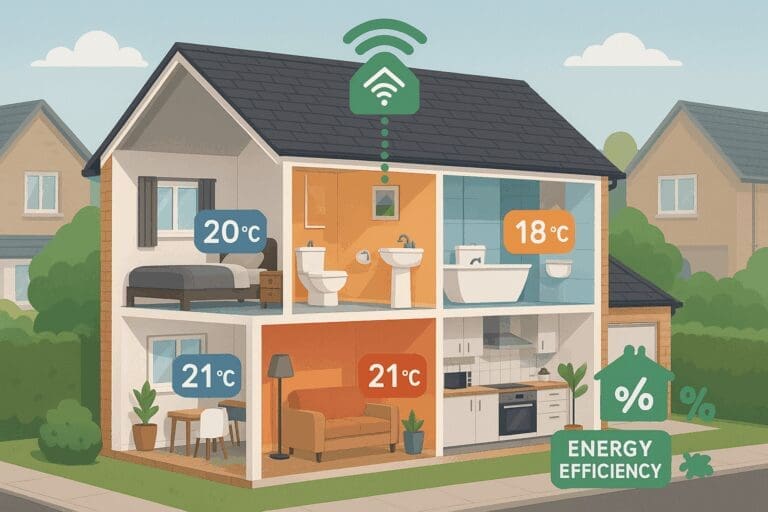Table of Contents
Smart heating controls can reduce UK household energy bills by 8-16%, saving the average home £150-350 annually. With rising energy costs and improved technology, 2025 represents the optimal time for UK homeowners to upgrade from basic thermostats to intelligent heating management systems.
Understanding Smart Heating Control Benefits
Proven Energy Savings
Independent studies show:
- 8-12% savings: Basic smart thermostats with scheduling
- 12-16% savings: Advanced systems with room-by-room control
- 15-20% savings: Full smart systems with learning algorithms
- Additional 5-8%: Integration with smart TRVs (thermostatic radiator valves)
Average UK household: £1,200 annual heating costs Potential savings: £96-240 annually with smart controls
How Smart Controls Save Money
Precise Temperature Control:
- Eliminate heating overshoots and undershoots
- Optimise heating schedules for occupancy patterns
- Prevent unnecessary heating of unused rooms
Adaptive Learning:
- Learn household routines automatically
- Adjust heating timing for optimal comfort and efficiency
- Account for external temperature changes
Remote Management:
- Adjust heating from anywhere to prevent waste
- Receive alerts for system issues
- Monitor energy usage in real-time
Top Smart Heating Systems for UK Homes
1. Nest Learning Thermostat (3rd Generation)
Cost: £200-250 installed Annual Savings: £120-200 Payback Period: 15-18 months
Key Features:
- Auto-scheduling learns your routine
- Geofencing detects when you’re away
- Energy history tracks usage patterns
- Works with 95% of UK heating systems
Best For: Tech-savvy homeowners wanting comprehensive automation with minimal setup effort.
2. Hive Active Heating 2
Cost: £150-200 installed Annual Savings: £100-180 Payback Period: 12-15 months
Key Features:
- British Gas ecosystem integration
- Simple app control and scheduling
- Holiday mode for extended absences
- Compatible with existing Hive products
Best For: Homeowners preferring UK-based support and simple, reliable operation.
3. Tado Smart Thermostat V3+
Cost: £180-230 installed Annual Savings: £130-220 Payback Period: 10-14 months
Key Features:
- Weather adaptation technology
- Open window detection
- Geofencing for multiple occupants
- Works with heat pumps and traditional boilers
Best For: Energy-conscious users wanting maximum efficiency optimisation.
4. Honeywell Evohome
Cost: £400-800 (multi-zone system) Annual Savings: £200-400 Payback Period: 18-24 months
Key Features:
- Individual room temperature control
- Up to 12 zones per system
- Professional installation required
- Advanced scheduling per room
Best For: Large homes wanting precise room-by-room control.
Smart TRVs: Room-by-Room Control
Leading Smart TRV Systems
Drayton Wiser:
- Cost: £60-80 per radiator
- Hub required: £100-130
- Total system cost: £300-500 (4 radiators)
Tado Smart Radiator Thermostats:
- Cost: £70-90 per radiator
- Bridge required: £60-80
- Total system cost: £340-440 (4 radiators)
Honeywell evohome Radiator Controllers:
- Cost: £80-100 per radiator
- Controller required: £200-250
- Total system cost: £520-650 (4 radiators)
Smart TRV Benefits
- Heat only occupied rooms
- Individual room scheduling
- Window-open detection
- Integration with main thermostat
- Additional 5-10% energy savings beyond smart thermostats
Installation Requirements and Compatibility
Boiler Compatibility Check
Compatible Systems:
- Combi boilers (95% compatibility)
- System boilers with hot water cylinders
- Heat-only boilers with separate hot water
- Heat pumps (check specific model compatibility)
Wiring Requirements:
- Most smart thermostats require mains power connection
- Some wireless models use battery power
- Professional installation recommended for safety and warranty
Common Installation Challenges
Older UK Properties:
- Limited wiring to thermostat location
- Complex heating systems with multiple zones
- Unreliable WiFi coverage throughout property
Solutions:
- Wireless thermostats for limited wiring
- WiFi extenders for improved connectivity
- Professional assessment for complex systems
Advanced Features Worth Paying For
Weather Compensation
How it works: Adjusts heating based on outdoor temperature Savings potential: Additional 3-5% efficiency improvement Available in: Tado, advanced Nest algorithms
Multi-Zone Control
Benefits: Heat only occupied areas Savings potential: 10-25% reduction in large homes Cost: £300-800 depending on system complexity
Integration with Smart Home Systems
Platforms: Alexa, Google Home, Apple HomeKit Benefits: Voice control, automation routines Energy impact: Minimal direct savings but improved convenience
Real-World Performance Data
Case Study: 4-Bedroom House in Kent
Before smart controls:
- Annual heating cost: £1,400
- Average temperature: 21°C throughout
- Manual thermostat adjustments
After Nest installation:
- Annual heating cost: £1,150 (18% reduction)
- Optimised room temperatures: 18-22°C
- Automatic scheduling and geofencing
ROI: System paid for itself in 14 months
Case Study: Victorian Terrace with Smart TRVs
Property: 3-bedroom Victorian house System: Drayton Wiser with 8 smart TRVs Results: 22% reduction in heating costs Key factors: Room-by-room control, unused room management
Installation Process and Costs
DIY vs Professional Installation
DIY Installation:
- Suitable for: Simple wireless thermostats
- Cost savings: £80-150 in labour costs
- Requirements: Basic electrical knowledge, good WiFi
Professional Installation:
- Required for: Wired thermostats, multi-zone systems
- Cost: £80-200 depending on complexity
- Benefits: Warranty protection, safety compliance, optimal setup
What’s Included in Professional Installation
- System compatibility assessment
- WiFi connectivity optimisation
- Initial setup and user training
- Integration with existing heating controls
- 12-month installation warranty
Maximising Smart Control Savings
Optimal Temperature Settings
Recommended temperatures:
- Living areas: 18-21°C when occupied
- Bedrooms: 16-18°C (cooler promotes better sleep)
- Unused rooms: 12-16°C (prevent dampness)
- Night setback: 2-4°C reduction during sleep hours
Smart Scheduling Strategies
Weekday patterns:
- Heat before wake-up time
- Reduce temperature during work hours
- Warm home before evening return
- Night setback during sleep
Weekend adjustments:
- Later morning heating start
- Maintain comfort during day
- Account for different occupancy patterns
Integration with Other Energy Measures
Combine smart controls with:
- Improved insulation (walls, loft, floors)
- Efficient boiler servicing
- Smart home automation
- Energy monitoring systems
Cumulative savings: Can achieve 25-35% total heating cost reduction
Common Mistakes to Avoid
1. Oversized System Selection
Problem: Paying for features you won’t use Solution: Assess actual needs before purchasing premium systems
2. Poor WiFi Coverage
Problem: Unreliable connectivity affecting performance Solution: Test WiFi strength throughout property before installation
3. Inadequate User Setup
Problem: Suboptimal schedules reducing savings potential Solution: Professional setup or comprehensive user training
4. Ignoring Maintenance
Problem: Reduced efficiency over time Solution: Regular system updates and annual heating system servicing
Future-Proofing Your Investment
Emerging Technologies
Heat pump integration: Most smart systems now compatible AI optimisation: Advanced learning algorithms improving Grid integration: Time-of-use tariff optimisation Renewable integration: Solar and battery system compatibility
Government Initiatives
Green Homes Grant: Potential funding for efficiency improvements Net zero targets: Increasing focus on home energy efficiency Building regulations: Smart controls becoming standard requirement
Smart heating controls represent one of the most cost-effective home energy improvements available to UK homeowners in 2025. With proven savings, improved comfort, and rapid payback periods, they’re an essential upgrade for energy-conscious households.
For professional smart heating control installation and advice, contact Plumbing Angels on 01732 792 454. Our Gas Safe engineers specialise in smart heating system integration throughout Kent.

Typical savings range from 8-16% annually, translating to £96-240 for average UK households. Room-by-room control systems can achieve 15-25% savings in larger homes through precise temperature management.
Most smart thermostats work with 95% of UK heating systems including combi, system, and heat-only boilers. Heat pump compatibility varies by model, so check specifications before purchasing.
Wireless battery-powered units can be DIY installed, but wired thermostats require professional installation for safety and warranty coverage. Multi-zone systems always need professional setup.
Payback periods typically range from 12-24 months depending on system cost and household energy usage. Basic smart thermostats often pay for themselves within 15-18 months.
Yes, all modern smart heating systems offer smartphone app control from anywhere with internet connectivity. This includes scheduling, temperature adjustment, and system monitoring capabilities.
Most systems have battery backup for basic operation, but full smart features require mains power and WiFi connectivity. Traditional manual override is usually available during outages.
Smart controls mean smart savings. Invest in efficiency that pays for itself.

